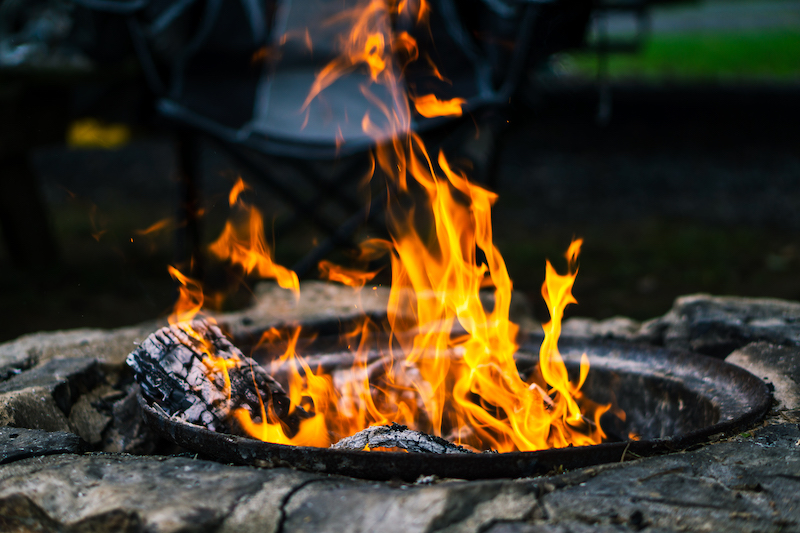One thing that’s pretty hard to get used to when you’re first learning Welsh is the sheer level of dialectical variation. On a basic level, vocabulary and grammar tend to vary between the North and South parts of the country, but it’s not as simple as that! In fact, fairly often, a word might be used across the country but have a different meaning in different regions.
Talking about things that are hot or warm is one area where you’re bound to see some regional differences. In the North, generally poeth is used for hot and cynnes for warm. In the South, the preferred word is twym, which means warm or sometimes hot, but poeth shows up occasionally too.
poeth
hot
On the other hand, cold is pretty simple; it’s just oer. Something very cold might be described as rhewllyd (icy / frosty) or iasoer (chilly cold).
As a proud mid-Walesian (and we often get left out of this conversation!), I usually use poeth for hot and twym for warm. This article is about poeth, but when you’re speaking Welsh, it’s always good to be aware of the alternatives. Nothing is ever as simple as it seems!
There’s actually a little bit of variation in terms of pronunciation, too. Though the standard way to say it is as above, colloquially in the South you may hear it said like this, with the oe transformed to an o:
Poeth probably came from a proto-Celtic word meaning cooked, which might have been something like *kwoktos or *poktos. This would make it etymologically related to pobi (to bake).
If you are referring to multiple different hot things, you should technically use the plural form of the adjective, which is poethion. This is becoming less common in casual spoken Welsh today, though. And to compare degrees of gwres (heat), you can use the useful words poethed (equally hot), poethach (hotter), and poethaf (hottest).
Another time when poeth turns up in a different form is of course when it mutates. Here are the possibilities:
Soft mutation
boeth
Nasal mutation
mhoeth
Aspirate mutation
phoeth
It’s also the root of several more useful words, like:
- poethi = to heat up
- poethder = heat (a synonym of gwres)
- chwilboeth = very hot
- crasboeth = hot and dry
- poethwg = aridity

Like the English hot, the Welsh poeth is used in a variety of ways aside from those which refer directly to gwres (heat). For example, it might be used to refer to a difficult situation, a hot-headed person, something that is cooked or burnt, or, of course, spicy food, in which case it is a synonym of sbeislyd.
What I find really fun is that the peppermint plant is often described as poeth (hot) in Welsh. There are two common ways to say peppermint in Welsh: the literal translation pupur-fintys and the alternative mintys poethion (hot mints). I absolutely love this because it perfectly captures that unique sensation mint gives you—so cold it’s almost spicy!
There are a lot of other foods that are poeth. Of course, we have some direct equivalents to English, like ci poeth / poethgi (hot dog) and siocled poeth (hot chocolate). But there’s also gwin poeth (mulled wine), and bara poeth (gingerbread) – though it’s also referred to as torth sinsir, bara sinsir or cacen goch. And poethrawn (hot grape) is an old-fashioned word for pepper, which today most people call pupur.
Dwedwn taw coffi yw fy hoff ddiod boeth, ond dw i hefyd yn hoffi te.
I’d say that my favourite hot drink is coffee, but I also like tea.
The word also used to be used to describe various illnesses, like clafri poeth (scurvy), and clefyd poeth, which referred to various types of fever, particularly typhus or syphilis. Today, fever is actually still sometimes called clefyd gwresog or clefyd y gwres.
There’s one kind of salwch (sickness) that continues to be described as poeth, which is dŵr poeth (heartburn, literally hot water). This is the most common term everywhere in Wales but Dyfed, where you’d be more likely to use llosg cylla (stomach burn) or llosg calon (a direct translation of heart burn).
Before we finish up, let’s take a look at some more useful vocabulary related to things that are poeth and oer.
Tymheredd (temperature) is measured in graddau (degrees). The Celsius system of graddau which we use in the UK is based on the properties of dŵr, so sero (zero) is fixed at pwynt rhewi dŵr (water’s freezing point), and cant (one hundred) is pwynt berwi dŵr (water’s boiling point).
Since Celsius comes from the surname of a scientist, it remains the same in Welsh. So, for example, ten degrees Celsius is deg gradd Celsius. We even pronounce it as it would be said in English, so the c makes a s noise, which is completely abnormal in Welsh.
Mae’n boeth heddiw – beth am i ni fynd i’r traeth?
It’s hot today – how about we go to the beach?
The specific tymheredd at which things mynd ar dân (catch fire) is less predictable; it depends on the object in question. Still, you’d think there’d be no need to specify that tân is normally poeth – but actually tân poeth is a regular expression in Wales. It’s used to refer to hellfire, so not the jolliest, but it comes up in this rhyme:
Crist croes, tân poeth
Torri’m mhen a’m dwy goes
Christ’s cross, hellfire
Break my skull and both legs
As you might have guessed, it’s an equivalent of cross my heart and hope to die. The full version is only really used by children, but adults in Welsh-speaking areas might say cris’-croes tan poeth or the alternative cris’-croes y Beibl (Christ’s cross of the Bible) to seal a promise.
Another infernal use of poeth comes in the form of a curse – yn boeth y bo – which is used in North-West Wales. It’s a very strong remark which basically wishes damnation on the subject.
A more familiar and less unpleasant idiom is taro’r haearn tra bo’n boeth (to strike while the iron is hot)… which, incidentally, is a great way to think about language learning. There’s no better time than now to work on your Cymraeg! Let us know how you personally are going to taro’r haearn tra bo’n boeth and level up your language learning this week! 😉

